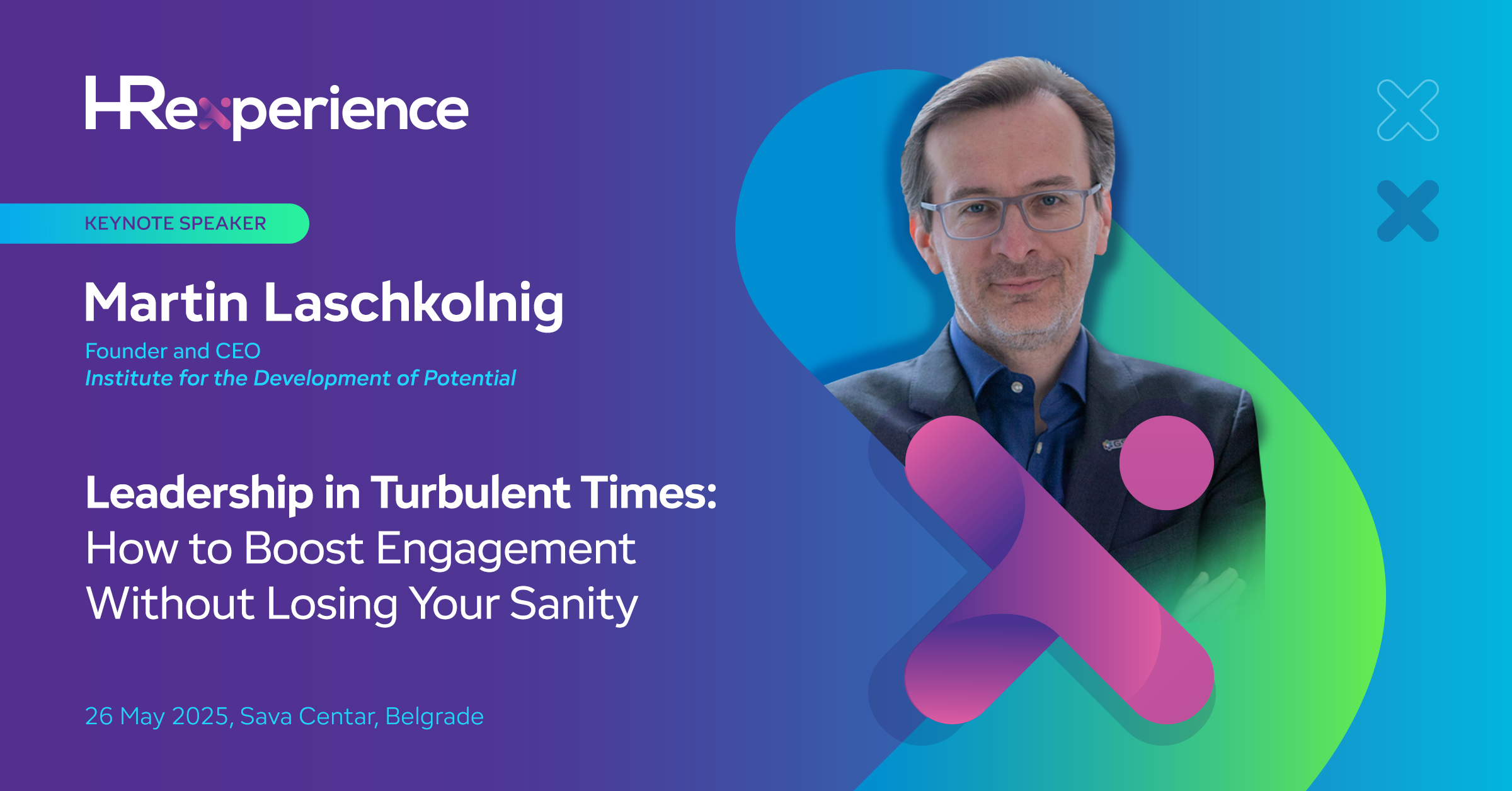
In the lead-up to this year’s HR Experience conference, I had the pleasure of speaking with Martin Laschkolnig - international speaker, mentor, and Founder of the Institute for the Development of Potential - who will deliver the opening keynote on May 26th in Belgrade. Leadership in Turbulent Times: How to Boost Engagement Without Losing Your Sanity.
His session, titled “Leadership in Turbulent Times: How to Boost Engagement Without Losing Your Sanity,” offers a clear, actionable model for creating engaged, resilient teams - without sacrificing mental clarity or burning out. Martin brings a unique blend of Western business strategy and Eastern philosophical perspective, helping leaders build a culture of focus, composure, and sustainable motivation in uncertain times.
In our conversation, he shared what today’s biggest leadership challenges are, how to transform stress into something productive - and why sometimes the most important shift is simply realizing you don’t have to believe everything you think.
Your keynote touches on how leaders can stay composed and focused in turbulent times. In your opinion, what’s the biggest challenge leaders face today – and why?
The biggest challenge that leaders face today is, on the one hand, the uncertainty that has only become more challenging with the change in the predictability of the world’s largest economy, the United States - this affects every economy in Europe as well.
More strategically, Gartner has just released its findings in a 60-country survey about the top priorities for HR in 2025, and the top three are: “Leader and manager development,” “Organizational culture” - both maintaining the same rank as last year - and “Strategic workforce planning,” which has moved up from sixth to third place.
Essentially, all of these revolve around the culture we live in our organizations - on the one hand, the culture we are aiming for, and more importantly, the one currently experienced by teams and shaped by their leaders. That’s why leadership and management development cannot really be separated from organizational culture - they are completely interconnected. In my opinion, only when we are clear and have a strong commitment from the C-level down about the kind of intentional culture we are striving for, can we also set the right objectives for leadership development.
As a famous German comedian said in the 1930s about raising children: trying to educate them is pointless - they’ll just imitate everything you do. And the same applies to leadership: if you are not the role model for the behavior you want to see, people will not adopt it either.
You’ve helped people across the world build inner peace and professional clarity. What’s one early sign that a leader is “losing their center” – and how can they catch it in time?
This can show in many different ways, but a definite sign is when leaders are too busy to lead - when they don’t have time to listen anymore, to connect with their team. Regardless of whether it’s the actual or the perceived stress and pressure for themselves is too big - if they can’t „survive“ without non-stop hustle to get their own work done, they won’t have the time anymore to fulfil their leadership commitment. After all a leader's job is not to be better than everyone on their team, but to be the best at creating the environment so that their team can be brilliant at their job. posao lidera nije da bude najbolji u timu, već da stvori uslove da tim može da briljira.
Furthermore, everyone can do a quick self-assessment: How high is my stress level on a scale from 1 (totally relaxed) to 10 (completely overwhelmed). Anything that’s beyond a 6 or 7 should be a warning sign. Interestingly enough the evaluation might be (quite a bit) different when you ask the team members, but that’s another story.
In your experience, how do stress and motivation interact? Can stress ever be a source of growth, or is it always something to reduce?
There is positive stress and negative stress. Stress in itself is nothing bad – it just means that the body is on alert, and if we are performing full out (be it in sports or at work), we also experience stress: the body creates adrenaline, the pulse is higher, etc.
The problem arises when stress is caused by anxiety and overwhelm — or even worse, when it becomes chronic. Then the body doesn’t get a chance to recuperate anymore. A great way to check this is a 24-hour HRV (heart rate variability) test. For “normal” people, the HRV shows recovery during the night and in downtime. People with excessively high stress levels no longer experience that — and then it gets really dangerous.
So if you can’t stop the racing thoughts and worries anymore and don’t sleep properly, that’s a very strong signal. Or if you can only relax by using intoxicating substances (in our societies, most often alcohol).
So, stress can be a good thing — it means we are focused, fully on, and ready to perform (and even experience joy while doing so). But we also need the recuperation phase. Otherwise, we may still want to do things — but no longer be able to.
You went through a very personal transformation that shaped your approach to leadership. What’s one key insight that came out of that journey?
I always like to say that crisis is inevitable, but suffering is optional. Life gets in the way — that’s what it does. In our societies, we are so used to pushing through that we’ve lost track of how we actually feel.
So, one key insight for me was to very intentionally form habits of self-care. I made even more sure to regularly set aside some me time — for a walk in nature, meditation, yoga, breathing exercises, or whatever works for you.
Make sure to prioritize that — even if it’s only for 5–10 minutes a day (I know, we all have busy schedules with work, relationships, and family commitments). The key here is to start building a habit, because habits become automatic — and you don’t have to think about them anymore.
If HR and business leaders could make just one mindset shift this year, what would you recommend – something simple that leads to big change?
That is a bit difficult to say, because no one is at exactly the same stage, but I’ll share several of these in my talk. Here are two that can be total game changers if applied consistently:
1. Realize that you don’t have to believe everything you think. Don’t allow your inner critic to take over. Acknowledge what is, accept reality, but also know that you can choose to be possibility-oriented (and sometimes that is harder than at other times). Be intentional in your self-talk and also in your communication with your team. It makes a huge difference whether you focus on what’s not working or put your main energy into how you could make it work – and also accept when you realize there’s no way to make it work.
When you do no. 1, ask yourself: Is this something that I can control, or something I can’t control anyway And decide to put your energy only into the things you can actually do something about..
Bonus tip: Accept your humanityWe all have days when it’s easier to keep your spirit high, and others when it’s more difficult. When it’s hard, acknowledge that, too. Tell yourself: Hey, today it feels really hard. I did my best and that is okay. I am allowing myself to try again tomorrow. Maintain healthy discipline, but also accept that sometimes there are days when things just don’t go well - and that’s okay, too. Be compassionate with yourself, not just with others.
Don’t miss the opportunity to meet and hear Martin Laschkolnig live in Belgrade!


